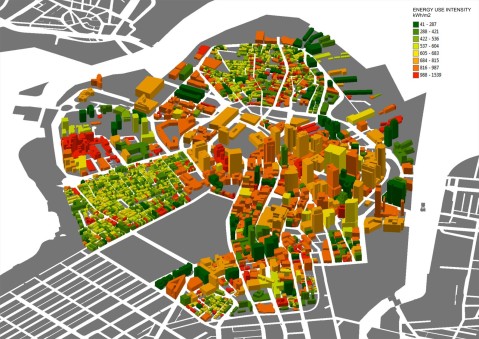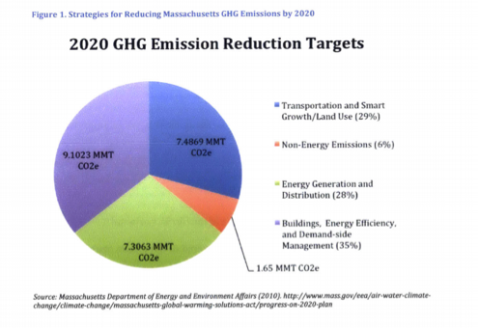Category Archives: policy
Shifting from litigation to innovation in energy policy

David Musselman (SM’ 17) came to DUSP after a 30 year career as an attorney in the energy and environmental services industries, including two stints as a general counsel. In his words “I was ready to do something different, and MIT offered me the opportunity to explore a range of issues affecting communities including climate change, economic development and transportation issues.”
A month ago, Musselman started a new position as Director of the Municipal Energy Unit at the City of Boston. This new role which allows him to blend his years of experience with the new skills and ideas he learned at MIT.
Boston has committed to reduce its carbon footprint by 50% by 2030. One key aspect of this goal is reducing energy use from the City’s buildings – it owns over 300 buildings of a wide range of sizes, ages and uses including schools, libraries, police and fire stations, community centers. One of Musselman’s key responsibilities is overseeing a multi-department effort to reduce energy use.
He is leading a pilot program designed to identify energy conservation measures (ECM) and the expected savings. The savings will be used to finance the implementation of the ECMs. Working with an energy services contractor to conduct full audits of 38 buildings, Musselman and team will be able to identify potential ECMs and projected savings.
Utilizing this list, the City will select the measures and a energy services company will install them at a guaranteed price and will guarantee the savings. Based upon the guaranteed savings, the City will finance the work and repay the loans with the energy savings. The expectation is that once the pilot program is complete, there will be additional phases to address more buildings for the City, which will help it achieve its carbon reduction footprint goal.
Image credit: MIT Sustainable Design Lab via Boston Planning and Development Agency
Iceland’s food system at risk

Photo by Holly Jacobson, 2016
There is no doubt that islands are particularly vulnerable to climate change. This leads to an array of risks, one being threats to food security. Cheap agricultural imports, one way of trying to ensure food security, can undermine the financial stability of small farm businesses in a country like Iceland. Farmers around the world are already a vulnerable to the physical effects of climate change, but in a country like Iceland the lack of a contingency plan and the failure to adopt adaptation measures for food security are shocking. Holly Jacobson, MCP’16 investigates why Iceland is in this situation. She explores the way governmental and non-governmental actors think about risk and resilience. Understandably, economic concerns are at the top of many people’s list. However, moral, sentimental and ideational values also shape risk perception and ought to be taken into account. How can planners take account of different kinds of vulnerabilities in formulating resiliency plans?
Continue reading Holly’s thesis by downloading it here.
The role of Massachusetts in making a case for the adoption of a nationwide carbon tax policy

Massachusetts’ Global Warming Solutions Act (GWSA) passed in 2008 committed the state to reducing carbon emissions 25% below 1990 levels by 2020 and 80% by 2050. Progress towards meeting these targets has been uneven, especially when it comes to transportation improvements and land use policy. This is especially worrisome given that transportation emissions are likely to rise over the next few years. One possible solution, supported by much of the environmental community, is the adoption of a revenue-neutral carbon tax or carbon fee. This would levy an additional fee on fossil fuel consumption, but distribute the revenue back to the state’s residents instead of adding it to the state budget. MCP 15 Elizabeth argues that this would be a mistake. She draws from a spatial analysis of passenger vehicle driving patterns in Massachusetts, a case study of British Columbia’s successful revenue-neutral carbon tax, and analysis of the current political landscape in Massachusetts to make her case. What are the flaws in this potential strategy? How do the state’s efforts relate to nationwide efforts to adopt a carbon tax? You can find the answers to these questions and more by downloading Elizabeth’s thesis in the following link:
Urban Agriculture Contributes to Sustainable Development of Cities: How do we make it permanent?

In the 21st century cities have increasingly adopted sustainability as a guiding principal, offering a window of opportunity for the incorporation of urban agriculture into city land use planning efforts. In addition, the engagement of commercial urban farms with local economies has allowed urban agriculture to enter the realm of economic development. Despite these advancements, many still frame their understanding of urban agriculture as interim land use while waiting for appropriate real estate development to happen. In his 2014 thesis, Andrew Cook (MCP ’14) argues the sustainable development characteristics of urban agriculture can only be accessed by treating it as permanent rather than a temporary land use.
To illustrate his argument, Andrew draws on a case study of Baltimore City, specifically the temporary use on city-owned land programs: Adopt-A-Lot and Homegrown Baltimore Land Lease Initiative. Andrew traced the historical relationship of urban agriculture to city development, Baltimore’s shrinking population, Baltimore’s policy environment as well as the histories of each program. He found that Baltimore’s view that urban agriculture runs counter to the economic growth objectives of a city, has limited the sustainability, economic, environmental and social benefits of urban agriculture projects. Through his evaluation of several urban commercial farms, community farms and demonstration farms, Andrew provides an alternate view, showing how urban agriculture can drive rather than hindering economic development. He offers a series of recommendations that woucl allow cities to realize the maximum benefit of urban agriculture. To learn more, read Andrew’s full thesis here.
Can grass-roots innovation be scaled-up through the design and maintenance of social and policy networks?
 The states are the “laboratories of democracy. ” They are often the source of new policy ideas, including new strategies for encouraging investment in renewable energy. Some of these ideas spread; others don’t. The process of diffusion is inherently a social process; implementation is achieved via a network of actors. Ryan Cook’s thesis looks closely at the way in which Solarize, a community-based energy program has moved across the country.
The states are the “laboratories of democracy. ” They are often the source of new policy ideas, including new strategies for encouraging investment in renewable energy. Some of these ideas spread; others don’t. The process of diffusion is inherently a social process; implementation is achieved via a network of actors. Ryan Cook’s thesis looks closely at the way in which Solarize, a community-based energy program has moved across the country.
Ryan Cook (MCP ’14) examines the way policy actors adopt and adapt innovative ideas to their particular needs. Through a study of Solarize on both the west coast and the east coast, Ryan documents the way in which network structure can facilitate the spread of energy programs. He argues that policy innovations are rarely entirely original. Instead, they are often an amalgamation of ideas which have been implemented elsewhere. The pathways that new policy ideas follow lead to substantial differentiation. For example, the core elements of Solarize include competitive contractor selection, community-based outreach, public education, and limited sign-up campaigns. However, as Solarize moved around the country, there are some versions that involve multiple contractors as well as different technologies.
By analyzing the social networks underlying the process of policy adoption, Ryan has discovered that issue-specific relationships that cross multiple policy networks are important. He has also identified organizational creativity, programmatic flexibility, and a commitment to continuous learning (rather than just imitation) as important explanations for why and how policy innovations diffuse. Read more about the ways in which grass roots innovation can be scaled-up through the design and maintenance of social and policy networks. Ryan’s thesis complete thesis can be accessed here.
The Role of the Political Scientist
In an ideal world, environmental management policy would follow directly from scientific research, which would spell out clear courses of action for decision-makeImagers to adopt. Unfortunately, this is rarely the case. The policy-making process is notoriously messy and science may be interpreted differently by multiple audiences and actors, severely diminishing the impact that scientific knowledge can have on policy outcomes. In this frustrating context, how can scientists ensure that their work is contributing positively to sound environmental management practices?
 In her thesis, Erica Simmons (MCP ’13) looks at three ways in which scientists have attempted to influence the political process in the case of the management of the San Francisco Bay-Delta. The first was the CALFED Science Program, which in the early 2000s adopted an approach of political neutrality, emphasizing instead the strengthening of relationship between scientists and policymakers of all perspectives. This was succeeded by a partnership between scientists at UC Davis and policy researches as the Public Policy Institute of California, which from 2007 to 2013 took on the role of political advocate and advanced explicit policy recommendations informed by scientific research. Most recently, the San Francisco Estuary Institute partnered with KQED, a regional public radio station, to develop a package of radio and interactive web content to educate the public about environmental management issues in the Bay-Delta.
In her thesis, Erica Simmons (MCP ’13) looks at three ways in which scientists have attempted to influence the political process in the case of the management of the San Francisco Bay-Delta. The first was the CALFED Science Program, which in the early 2000s adopted an approach of political neutrality, emphasizing instead the strengthening of relationship between scientists and policymakers of all perspectives. This was succeeded by a partnership between scientists at UC Davis and policy researches as the Public Policy Institute of California, which from 2007 to 2013 took on the role of political advocate and advanced explicit policy recommendations informed by scientific research. Most recently, the San Francisco Estuary Institute partnered with KQED, a regional public radio station, to develop a package of radio and interactive web content to educate the public about environmental management issues in the Bay-Delta.
These three approaches offer very different ideas about how scientists should approach policymaking, whether as a non-biased researchers, data-backed advocates, or public informers and educators. As Erica notes, these efforts have built upon one another and addressed the weaknesses of prior models: the UC Davis-PPIC partnership was purposely more politically assertive than CALFED, and the SFEI-KQED collaboration more actively drew the public into the policy discussion.
In the end, there is no blueprint for how scientists should approach policy issues, and the issue does not appear to be getting any easier. Still, scientists must adopt a strategy for how to interact with the policy discussion, and the methods they adopt can have important implications both for policy outcomes and for the public perception of scientific research. Read about these issues and more in Erica’s thesis.
As discussed in Erica Simmons theses, do you think it is possible for scientific findings to retain enough of their legitimacy inside the scientific community when they are being tailored to communicate and influence the broader populous?
